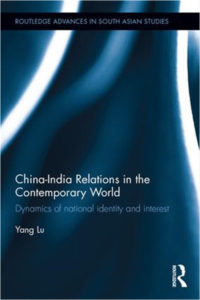
China-India Relations in the Contemporary World; Dynamics of national Identity and Interest
Yang Lu
Routledge (2017)
Rs14,416
As two Asian giants and rising power, the interactions between India and China have global significance. This book analyses the multifaceted and multi-layered character of Sino-Indian relations since the beginning of the 21st century in a period marked by cooperation and competition.
Positioned in a social constructivist framework that emphasizes mutual perceptions and socialization, the book draws analytical leverage from two core concepts – national identity and national interest – to form the basis of the research inquiry. The author argues that the dynamics of national identity and national interest play an important role in determining their relations and shows how and why in the current international structure, including a context of accelerated globalization, their national identities as rising power and emerging power coupled with national interest of economic development have defined and directed their international positions and foreign policy-making.
A unique approach to analysing Sino-Indian relations, this book is of interest to academics in the fields of Asian Politics and International Relations.
Yang Lu is a Postdoctoral Fellow in the Department of International Relations at Tsinghua University, China. Her research mainly focuses on South Asia and China, working on India-China relations, regional cooperation and sub-national movements in South Asia.
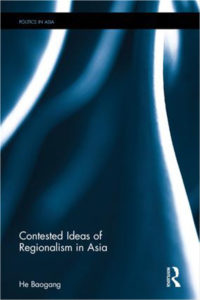
Contested Ideas of Regionalism in Asia
Baogang He
Routledge (2017)
Rs14,416
Deepening regionalism in Asia demands new leadership. Strong elites who are committed to a supranational identity are a minimum requirement of successful regionalism. Regional leaders are increasingly seen as a new set of leaders in Europe. Currently, Asian regional leaders largely come from the diplomacy community, or trade and economic sectors. Yet further regionalization demands a new type of leadership from civil society and citizens. In this context it is important to cultivate new regional leadership through the development of regional citizenship.
This book examines contested ideas of regionalism in Asia with a particular focus on two competing ideas of pan-Asianism and Pacificism. It also identifies a new trend and contestation, the fundamental shift from a civilization understanding of regionalism to a technocratic and functional understanding of regionalism in the form of regulatory regionalism. It also examines the other contested imaginations of regionalism in Asia including elitist versus participatory approaches to regionalism, and democracy-centric versus nationalism-centric approaches to regionalism.
Baogang He is Professor and Head of Public Policy and Global Affairs at Nanyang Technological University. He is also Chair in International Studies, Deakin University, Australia.
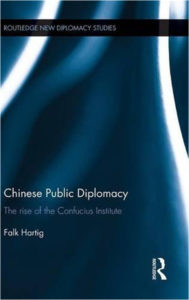
Chinese Public Diplomacy: The Rise of the Confucius Institute
Falk Hartig
Routledge (2017), Rs14,416
This book presents the first comprehensive analysis of Confucius Institutes (CIs), situating them as a tool of public diplomacy in the broader context of China’s foreign affairs.
The study establishes the concept of public diplomacy as the theoretical framework for analysing CIs. By applying this frame to in-depth case studies of CIs in Europe and Oceania, it provides in-depth knowledge of the structure and organisation of CIs, their activities and audiences, as well as problems, challenges and potentials. In addition to examining CIs as the most prominent and most controversial tool of China’s charm offensive, this book also explains what the structural configuration of these institutes can tell us about China’s understanding of and approaches towards public diplomacy. The study demonstrates that, in contrast to their international counterparts, CIs are normally organised as joint ventures between international and Chinese partners in the field of education or cultural exchange. From this unique setting a more fundamental observation can be made, namely China’s willingness to engage and cooperate with foreigners in the context of public diplomacy. Overall, the author argues that by utilizing the current global fascination with Chinese language and culture, the Chinese government has found interested and willing international partners to co-finance the CIs and thus partially fund China’s international charm offensive.
This book will be of much interest to students of public diplomacy, Chinese politics, foreign policy and international relations in general.
Falk Hartig is a post-doctoral researcher at Goethe University, Frankfurt, Germany, and has a PhD in Media & Communication from Queensland University of Technology, Australia.
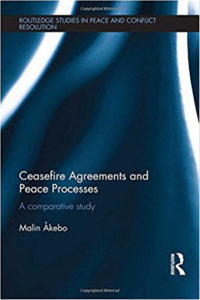
Ceasefire Agreements and Peace Processes: A Comparative Study
Malin Akebo
Routledge (2017)
Rs14,416
This book analyses and compares ceasefire agreements as part of peace processes in intrastate armed conflicts.
Research repeatedly underscores the importance of ceasefire agreements in peace processes but suggests that they can influence such processes in fundamentally different ways. However, despite contradictory expectations, remarkably few studies have so far been devoted to systematic and in-depth analysis of ceasefire agreements in contemporary intrastate armed conflicts. This book contributes to filling this gap by using a process-oriented conflict dynamics approach to analyse and explain how ceasefire agreements are being influenced by and in turn influences the broader dynamics of peace processes. Empirically, the book focuses on the armed conflicts in Aceh (Indonesia) and Sri Lanka. Based on document studies and 57 interviews with key actors, it presents comparative insights and in-depth knowledge about ceasefire agreements in different contextual settings. The book problematizes the common assumption in the literature that ceasefire agreements create momentum in peace processes and pave the way to peace, and it provides a more nuanced analysis and understanding based on two empirical cases analysed within a comparative framework. In contrast to conventional wisdom, it demonstrates how ceasefires on the contrary also can have negative implications on peace processes.
This book will be of much interest to students of conflict resolution, peace studies, intra-state conflict, security studies and IR in general.
Malin Åkebo is Researcher in the Department of Political Science at Umeå University, Sweden
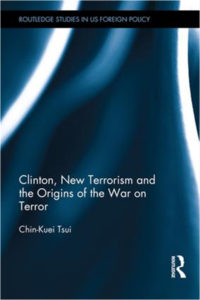
Clinton, New Terrorism and the Origins of the War on Terror
Chin-Kuei Tsui
Routledge (2017)
Rs14,416
A frequent assumption of the American-led ‘war on terror’ and its accompanying discourse originated largely with the George W. Bush Administration, and that there was a counterterrorism policy revolution in the U.S. political arena. Challenging these assumptions, through a genealogical analysis of U.S. terrorism and counterterrorism discourses, this book demonstrates a distinct continuity (and lack of change) of U.S. counterterrorism policy, from Ronald Reagan, to Bill Clinton, and through to George W. Bush.
The book focuses on President Clinton’s discursive construction of ‘new terrorism’, or ‘catastrophic terrorism’, and the counterterrorism practices implemented by the Clinton Administration, while simultaneously comparing it with President Reagan’s and President George W. Bush’s approaches to counterterrorism. It shows how the war on terror can be traced to earlier periods, and that the so-called Bush revolution was largely built upon the existing framework established by President Reagan and President Clinton. Prior to the 2001 terrorist attacks, Clinton had expanded Reagan’s first ‘war on terrorism’ discourse and constructed the ‘new terrorism’ discourse, characterised by the notions of borderless threats, ‘home-grown’ terrorism, WMD-terrorism, cyberterrorism, and rogue states. Clinton’s ‘new terrorism’ discourse provided a useful framework for George W. Bush to discursively respond to the terrorist attacks on September 11th, 2001.
Aiming to uncover the myth of President George W. Bush’s foreign policy revolution and contribute to a deeper historical understanding of the U.S.-led war on terror, it will be of great use to postgraduates and scholars of US foreign policy, security studies and terrorism studies.
Chin-Kuei Tsui is a postdoctoral fellow at Institute of Strategic and International Affairs, National Chung Cheng University, Taiwan. His research interests are U.S. foreign and security policies, the American-led war on terror, and critical terrorism studies. His post-doc research focuses on President Obama’s counter-extremism initiatives.

